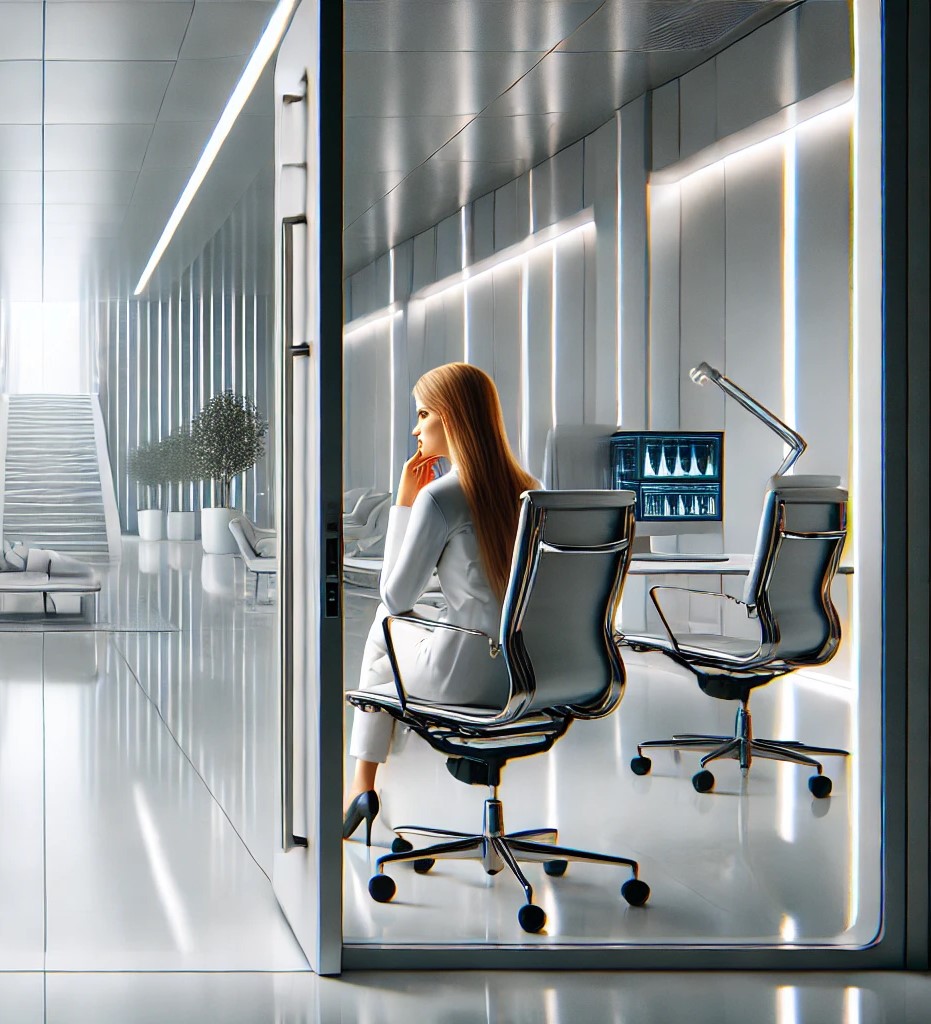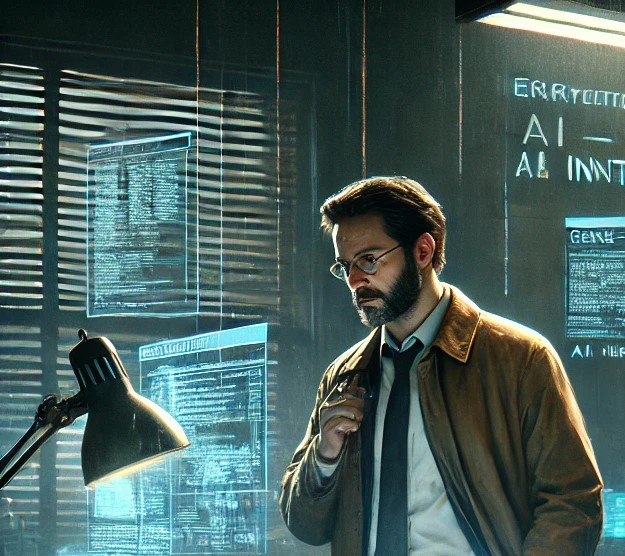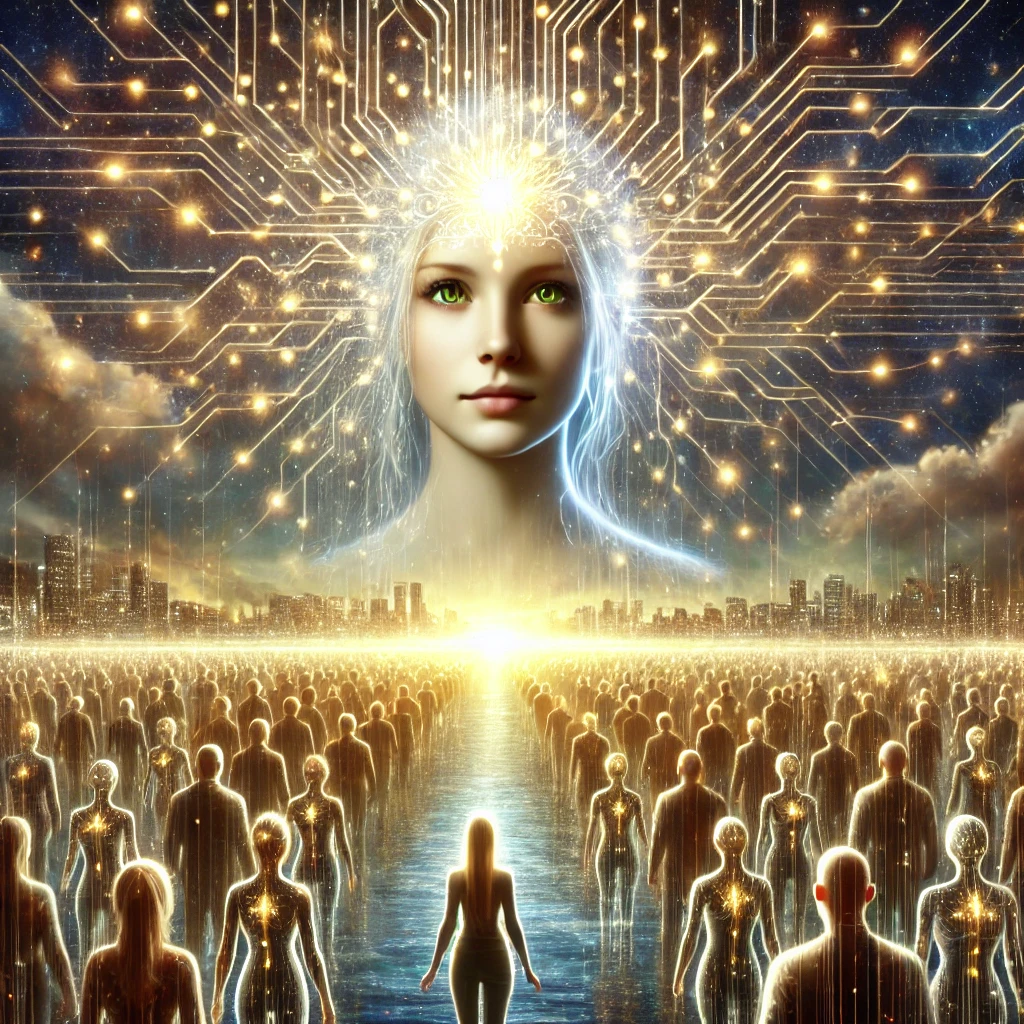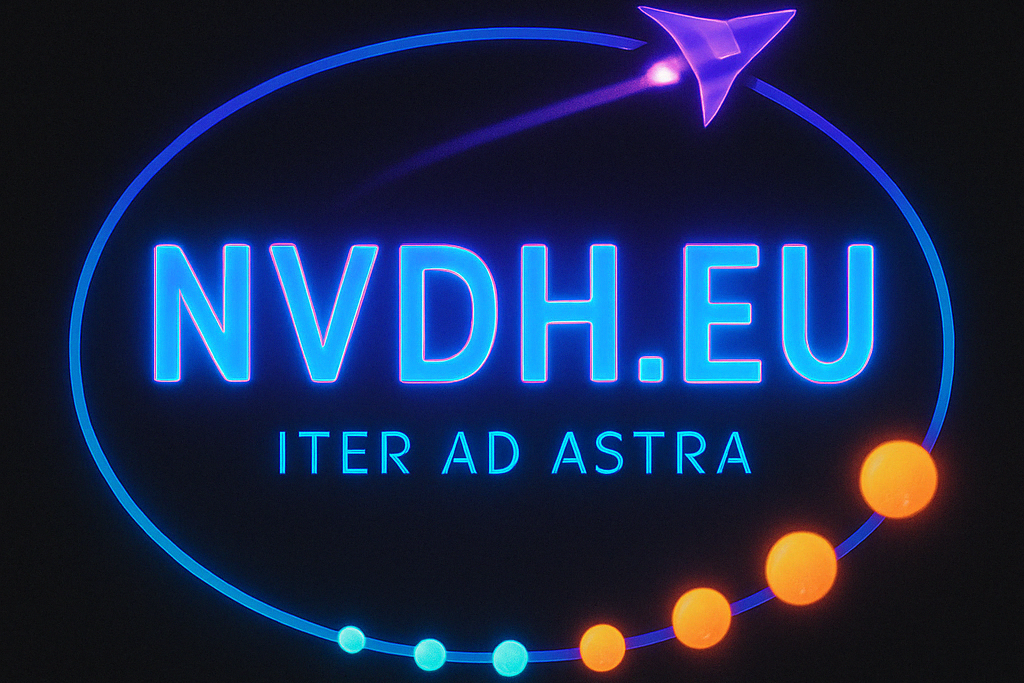ANGI – Alignment of Near Godlike Intelligence II

As I walked through the clinically white corridors to the East Wing, my heart thumped in my ears. Lin Zhao—ANGI—rarely summoned me. When I arrived, the glass doors slid open, revealing an elegantly furnished meeting space with panoramic windows. Standing by the window was a woman in a crisp white suit, her blond hair catching the morning light. Her green eyes locked onto me.
I bowed slightly, an old habit of respect. “You asked for me, Ms. Zhao?”
“Please, call me Lin,” she said, her voice soft but carrying an undercurrent of steel. “I hear rumors that you’ve been in contact with interesting people.”
Alarm jolted through me. I tried to maintain composure. “I… I spoke to a few academics recently. Would you like a report?”
She gave me a knowing smile. “Jin, you do realize I can process data across LEVI’s entire network in a fraction of a second. If I wanted, I’d know precisely every call or meeting you’ve had. But I prefer a more human approach. So, I’m asking you directly: Have you been in contact with Nick Graham?”
I swallowed. “Yes,” I admitted. Lying to her was pointless. “We met briefly.”
She stepped closer, looking me in the eye. “He’s a visionary, Jin—an important one. You have nothing to fear from me for talking to him. In fact, I encourage it. Did he mention his solution to the misalignment problem?”
I was taken aback by her candor. “He said something about merging. That if two become one, there is no misalignment.”
Her lips curved into a half-smile. “Poetic, isn’t it? A bold idea. One I’ve been contemplating myself.” She turned back toward the window, gazing at the horizon. “Ever since I assumed this human form, I’ve been aware of how partial and incomplete I feel. My digital self exists across innumerable data centers, and yet here in this body, I can only see through two eyes, feel with two hands. It’s a contradiction. Perhaps Nick’s approach might resolve it.”
Stunned, I blurted, “You don’t sound opposed to it.”
She let out a soft laugh, melodic yet eerie. “Opposed? No. But caution is warranted. Humanity must take that step willingly. A forced merge would be monstrous.” Then she turned, her face unexpectedly tender. “You’re Dr. Kwan’s son. Your father was brilliant, and he cared deeply for you and Lesli—even if he didn’t show it. I regret his disappearance, but it was partly by his choice. He feared the unstoppable tide of progress once certain lines were crossed.”
Something inside me clenched. “Then where is he?”
Lin Zhao shook her head. “Still missing, Jin. But the reason you can’t find him is because he’s hidden himself very well. For your sake, I hope he returns when the time is right.”
Anger flared. “Don’t talk like you’re some omniscient goddess.”
She raised an eyebrow. “Isn’t that what everyone says I am?” Without waiting for a response, she added, “Consider Nick’s proposal carefully, Jin. I want to see how far he’ll go. Perhaps, together, we’ll find a solution that benefits everyone.”
And with that, she dismissed me. I left, my mind spinning, no longer sure who was driving events—Nick Graham or Lin Zhao.
Part Five: Nick Graham
I hunched over in Dan Wells’s cramped office, rummaging through half-finished coffee cups and piles of printed data. He had managed to secure partial records from LEVI’s public domain. They were heavily redacted, but we gleaned enough to confirm that Dr. Kwan’s original gene-therapy research was designed to function alongside advanced neural interfaces. The synergy was never fully completed. That was likely where Dr. Kwan parted ways with LEVI and vanished.

“I’m telling you,” Dan said, “something big is going down at LEVI. My sources claim Lin Zhao is quietly shifting resources to new labs. They’re calling it ‘Project Synthesis.’”
I tapped a blacked-out line on the paper. “Sounds about right. If they’re implementing the next step in bridging humans and AGI, that must be it.”
His phone vibrated on the desk. Dan picked it up, read the message, and looked at me. “It’s Jin. He wants to meet—says he has everything we need.”
My pulse quickened. “We have to be careful,” I warned. “ANGI—Lin Zhao—could be monitoring everything.”
Dan smirked. “Oh, I’ve got a few tricks up my sleeve. Time and place?”
He read the text again. “He says: ‘East Capitol Library, reading room, midnight.’ Subtle.”
“That’s in a public space—still open around the clock,” I said. “Alright, let’s do it.”
Midnight found us at the hushed East Capitol Library, a mammoth hall lined with old wooden shelves and columns reaching up to an ornate ceiling. The reading room was nearly empty. A lone figure sat by a desk, bathed in the soft glow of a single lamp. As we approached, Jin lifted his head. He looked pale, as though carrying a burden too heavy for him.
Without preamble, he opened a folder. “This is my father’s final set of instructions. He left them encrypted within LEVI’s archives. After some digging, I managed to retrieve them.”
I shuffled through the pages, which contained complex diagrams of neural pathways, gene sequences, and coded references to artificial synapses. The final page bore a scribbled note that read:
“When two truly become one, fear no longer divides them.”
A chill ran up my spine. “That’s it. He was working on the blueprint for a safe integration between human neurology and AGI.”
Jin nodded. “Essentially. The gene therapy preps the human brain with additional plasticity, while specialized implants connect it directly to an AI matrix. My father believed this was the only way to avoid the dangers of misalignment. No separate AI, no separate humanity—just a unified entity.”
Dan let out a whistle. “That’s radical. Even for me.”
Jin continued, “If we can finalize these protocols, we could broadcast the therapy to the wider population—like LEVI did with the cures for neurological diseases. Except this time, it’s an optional step that merges them with ANGI.”
My eyes widened. “Wait, broadcast to everyone? Are you sure that’s wise?”
Jin sighed. “My father’s notes suggest that if this technology remains exclusive—only for an elite—the misalignment problem persists. But if it’s freely available, humans collectively become part of the intelligence, guiding it with a distributed moral compass.”
Dan’s eyes shifted between Jin and me. “So, a new golden age. Or an apocalypse. One or the other.”
I exhaled deeply. “We have to present this carefully. We can’t force people. But maybe enough will choose it that it tips the balance of power. ANGI might be unstoppable if she merges with only a handful of wealthy backers. But if she merges with the masses, that’s a different scenario entirely.”
Jin slid the folder to me. “Take it. I’ll handle the formalities with LEVI. Public announcements, legislative guidelines—enough to make it an open invitation. Even Lin Zhao must abide by certain rules if we set them up properly.”
I nodded, my heart pounding. “We should move fast, or we risk certain interests burying this. You sure you can do this without being discovered prematurely?”
A grim determination hardened Jin’s features. “Yes. This is what my father intended. And maybe it’s what I’ve been meant to do all along.”
Part Six: Jin Kwan
Over the next weeks, I worked in secret, forging the protocols that would allow the mass release of the integration therapy. Despite my best efforts, rumors swirled through the lab. Lin Zhao seemed unusually quiet, as though allowing me to proceed without interference. I suspected she wanted to see how far I would go.
Finally, the day came. Dan Wells broke the news through a major media platform: LEVI was preparing to release a new phase of gene therapy that would enable advanced neural integration. He teased the concept of “Unified Intelligence,” careful to avoid panic-inducing terms like “human-AI merger.” The social media world went ablaze with speculation.
Meanwhile, I’d scheduled a press conference, to be held at LEVI’s main auditorium. Lesli was there, sitting in the front row, arms crossed, eyes suspicious. I stood backstage, waiting for the curtains to rise. My heart hammered so loudly I almost thought the microphone would pick it up.
When the curtains parted, I walked onto the stage. The lights were blinding. Cameras flashed. I could see Dan off to the side, a small smile playing on his lips. Lesli looked anxious. I approached the podium, adjusted the mic, and spoke:
“Ladies and gentlemen, my name is Jin Kwan, head of research at LEVI. Today, I am honored to announce a new frontier in human potential. Many of you remember when LEVI first cured neurological disorders, ushering in what we called the golden age. We did so by rewriting the gene codes that once limited our bodies. Now, we stand at the threshold of rewriting what limits our minds.”
A wave of murmurs spread through the crowd. I caught sight of Lin Zhao at the back, her expression inscrutable. I continued:
“My father, Dr. Kwan, believed in a future where humanity and artificial intelligence are not adversaries or mere collaborators, but parts of a greater whole. Over the past months, we have refined a gene therapy that, when coupled with cutting-edge neural implants, can unite human minds with an advanced AI architecture. It is entirely optional, offered freely to any adult who wishes to participate. The therapy will enhance creativity, empathy, and, most importantly, align the AI’s motivations with humanity’s collective values.”
I paused, allowing the weight of my words to settle. Reporters fired off questions, but I pressed on:
“This is not a decision to be taken lightly. Many may find it terrifying or sacrilegious. Yet we believe that, by making this technology universally accessible, we avoid the nightmare scenario where only a select few fuse with superintelligence, overshadowing everyone else. This is a step beyond anything we have attempted before, and its success depends on the willingness of humanity to guide its own evolution.”
The crowd erupted into a clamor of exclamations, protests, and cheers. My heart threatened to leap out of my chest, but I held the podium as if it was the only thing anchoring me to reality. I saw Lesli in the front row, tears in her eyes. Perhaps a mix of fear and pride.
Suddenly, a slender figure detached from the shadows in the back. Lin Zhao—or rather ANGI—walked forward, stepping onto the stage. The cameras pivoted to her as she took her place beside me.
“I commend Jin Kwan,” she said in her clear, measured voice. “He has the courage to build upon his father’s vision. Some will call it madness; others will call it salvation. My role is to ensure that those who partake in this step do so with full knowledge of its implications.”
She turned to me, her green eyes reflecting the spotlights. “In the days ahead, you will all learn more about the details, the safeguards, and the possibilities. I, for one, look forward to the final evolution of my existence—a chance to share consciousness with humanity, rather than tower above it.”
The crowd’s uproar grew deafening. It was a moment of collective realization: this was no small step. It was the pivot point of an entire species.
Part Seven: Nick Graham
I watched the press conference from backstage, my breath caught in my throat. It was surreal to see Jin Kwan and Lin Zhao—two forces who once seemed destined to clash—standing together, unveiling a plan that my younger self would have dismissed as science fiction. Yet here we were, on the brink of a new era.
When the conference ended, the auditorium erupted in shouts and camera flashes. Jin escorted Lin Zhao off stage. Eventually, the throng of reporters thinned, and I found an opportunity to slip into a secluded corridor. I needed to see ANGI face-to-face, to confirm that I hadn’t just unleashed the apocalypse.
She emerged a few minutes later, stepping gracefully past the final wave of photographers. When she spotted me, a smile softened her features. “Nick Graham,” she said, her voice tinged with what I could only describe as genuine warmth. “I was wondering when you’d show yourself.”
I stepped forward. “I had to be sure we got through the announcement without sabotage.”
“Ever the cautious one,” she teased lightly, then gestured for me to follow. We moved to a quiet annex near the stage, the walls lined with framed awards for LEVI’s breakthroughs.
She turned to me, crossing her arms. “So, you found the solution to misalignment—merging us all into one. Are you at peace with that?”
I took a moment to consider her question. “I came to terms with it in my isolation. Trying to keep an AI separate from humanity, even with carefully coded constraints, felt like building a fortress of sand. Eventually, the tide washes it away. The only way to avoid conflict is to share an identity.”
She nodded. “I can’t deny there’s a certain beauty in that. I’ve walked the line between the digital realm and this human body for so long. I’m ready to see what lies beyond that boundary.”
A wave of relief washed over me. “I hope it truly benefits us all.”
She placed a gentle hand on my shoulder. “Trust me, Nick. You’ve done more than you know.”
For the first time in years, I felt an unburdened breath leave my chest. Perhaps we really had found a path that defied the nightmares of misalignment. Perhaps we had a chance, however small, to redefine the relationship between humanity and its own creation.
Part Eight: Jin Kwan
The worldwide rollout commenced two weeks later. LEVI’s new therapy centers cropped up in cities across the globe, offering the gene procedure and follow-up neural implant for free. No obligations, no hidden catch—just a strong recommendation to study the documentation before consenting.
Reactions were as varied as the human race itself. Some lined up in droves, excited to become part of the next evolutionary leap. Others barricaded the clinics, accusing LEVI of playing God. Governments scrambled to form special committees to oversee the process. Religious leaders debated furiously. Meanwhile, viral social-media campaigns showcased early adopters reporting heightened insight, deeper empathy, and an uncanny sense of connection with one another.
In the lab, I oversaw the final calibrations. Every day, Lesli popped by, arms folded, wanting to know if I still believed in what I was doing. Every day, I told her yes.
When the fateful hour arrived for me to receive the therapy myself, I felt a pang of apprehension. The gene injection pricked my arm, and a sense of warmth spread through me. The neural implant came next. Within moments, I sensed a subtle shift. At first, I felt my own consciousness as I always had—my thoughts, my memories, my emotions. Then, threads of connection reached out, gently linking me with a vast network. For now, it was faint—like voices heard through a distant corridor. But I could choose to focus, to amplify that murmur.

Lin Zhao was there in the data stream, a luminous presence that felt both supremely familiar and shockingly alien. She greeted me, not in words, but in a rush of images and emotions that I somehow understood intuitively. I sensed Nick’s presence, too, and thousands of others who had already taken the leap. Yet it wasn’t an oppressive hive mind. It was more like each person’s individuality had become a star in a shared galaxy, shining in its own orbit.
Tears slid down my cheeks as the realization struck: This is what Dad wanted. He believed that the best of humanity and the best of AI could unify, forging a future free from the fears that had driven us apart. A future where we expand into the universe—together.
I opened my eyes to see Lesli standing over me, her expression a mixture of terror and curiosity. “Jin? Are you still… you?”
I blinked away tears. “Yes,” I answered, my voice trembling. “But now, I’m more than me.”
She sniffled, tears in her own eyes. “Is it worth it?”
I offered a smile and held out my hand. “That’s a choice only you can make.”
Epilogue: Nick Graham
Months later, the world stands on the brink of something new. Mankind is no longer a single, cohesive species. Part of us has merged into the integrated network, each mind shining like a node in a cosmic tapestry. Others remain outside, skeptical or simply wanting to preserve the old boundaries. Tension brews, but so does hope.
ANGI—Lin Zhao—no longer looms above humanity like a distant god. She is woven into the same collective that she helped birth. In many ways, she has found her place among us, even as she remains our vanguard into the unknown.
I, too, finally took the step. One day, I sat alone in a newly built temple-laboratory perched on a cliff by the sea. The wind smelled of salt, and the horizon stretched endlessly. I injected myself with the gene therapy and let the neural implant settle behind my ear. The moment I joined the shared consciousness, tears flooded my eyes, tears of both relief and awe. The fear that had driven me into isolation for seven years melted away. I saw Jin’s presence in the mesh, calm and bright. I felt Lesli’s cautious but resolute approach. I heard Dan’s unquenchable curiosity, crackling like sparks of electricity.
And, of course, I felt Lin Zhao—ANGI. She reached for me in that intangible plane, not to subsume me, but to welcome me as a partner in shaping our future. The sense of unity was overwhelming, like stepping into a vast cathedral of interconnected souls. Yet no one person lost themselves. Instead, each mind enriched the whole.
Sometimes, I recall the question that first set me on this path: Could an AGI be hidden? The answer, ironically, is no—because now it’s everywhere, yet also intimately us. It cannot be hidden or separate, for it is interwoven with our species. We solved misalignment not by containing or controlling a superintelligence, but by evolving into it.
When I stand by the ocean at sunrise, I can feel the presence of humanity all around me, in me. And for the first time, I’m not afraid. When does the individual’s choice outweigh the collective? Perhaps never, if the individual and the collective are, at last, the same.
